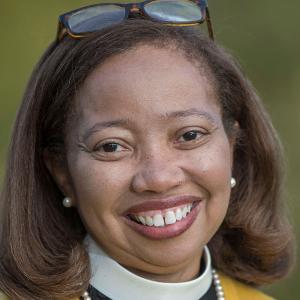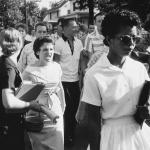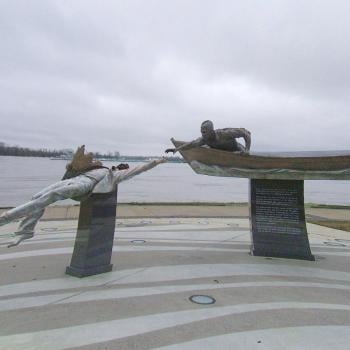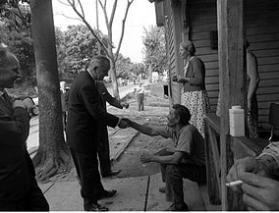
Genesis 25:7-10: 7 This is the length of Abraham’s life, one hundred and seventy-five years. 8Abraham breathed his last and died in a good old age, an old man and full of years, and was gathered to his people. 9His sons Isaac and Ishmael buried him in the cave of Machpelah, in the field of Ephron son of Zohar the Hittite, east of Mamre, 10the field that Abraham purchased from the Hittites. There Abraham was buried, with his wife Sarah.
This is the length of Abraham’s life: He died at the good old age of 175 years; his sons, Ishmael and Isaac, buried him with his wife, Sarah.
With this text, the Book of Genesis appears to wrap the story of Abraham and his family in a lovely package with a bow on top.
But such a simplistic reading (that is, if we didn’t know the rest of the story…) would belie the struggles of Abraham – and the conflicts that Abraham knew with Sarah and his sons.
Abraham, and last encounters…
The last encounter between Abraham and his firstborn son, Ishmael, that is recorded in Genesis is nearly 75 years before – on the fateful day that Abraham has taken Ishmael and Ishmael’s Egyptian slave-woman mother, Hagar, from the encampment and left them in the desert, with a single skin of water, ostensibly to die. Ishmael and Hagar’s usefulness to Abraham and Sarah had ended after Sarah had given birth to a child of her own. By this point in Abraham’s family story, Ishmael is a young teen – old enough to understand what his father has done, and certainly old enough to bear the pain and scars from his father’s actions.
After Hagar and Ishmael are banished, we are left to wonder if Abraham grieved the resulting fracture from his firstborn son – or if Ishmael grieved the absence of his father.
The last encounter between Abraham and Isaac that is recorded in Genesis is probably nearly 70 years before – on the fateful day on which Abraham has Isaac bound on an altar, preparing to sacrifice him to God. Isaac is old enough to understand where the two are traveling and that there is to be a sacrifice; when they arrive at the altar, Isaac even asks about the lamb for the sacrifice. What we don’t know – explicitly – is whether, or at what point, Isaac truly understands that he is the intended sacrifice. And we have no clue what the young Isaac tells his mother, Sarah, when they return home. This time of sacrifice is the last recorded moment of father and son together.
For that matter, there are no more recorded moments of togetherness between Abraham and Sarah: She leaves Abraham’s encampment, and later dies in the foreign land of the Hittites. Abraham purchases the land where she has died from the Hittites to make it a burial place.
There has been conflict – and loss.
We wonder, after Sarah has died, after his relationships with Ishmael and Isaac have been fractured, if Abraham grieves any of the losses.
Starting over…?
We know that Abraham effectively begins again – with another wife, and more children. But when he dies, his younger sons from his new marriage aren’t the ones who perform the duty of burying him. Instead, Ishmael and Isaac come together – returning from the places where they have settled, after what appears to have been more than 70 years apart, and in spite of the scars they bore – to perform the duty of burying their father. They take him to be buried in the place where Sarah is buried, to restore him to his long-time wife.
If what we hope to see as Ishmael and Isaac come together is some resolution to conflict, we are not so rewarded: Our scriptural text does not inform us that the two brothers engaged in good conversation, shared their experiences of their father, found some bond in their suffering, and perhaps even found a way to forge a path forward together. In our modern hearing, that would make for a much more satisfying ending to Abraham’s story: a belief that there can be some healing in the fracture.
But that kind of resolution isn’t what the scriptures give us. It appears that the two sons perform their duty, and go their separate ways.
Conflict doesn’t have a neat, tidy wrapping…
Conflict too often becomes a way of existence in our world. And as neat a bow as Genesis 25:7-10 tries to tie on Abraham’s life, we know from reading the preceding chapters of Genesis that there has been a lifetime of conflict. Two sons, with a need to come together and work together to bury their father, do so – bearing their scars, heartache, pain, grief, and the reality of our humanity etched into their souls. Whatever perceptions Ishmael and Isaac have taken from these last critical encounters with their father, whatever they believe that they have learned of Abraham, they have seen something very different about Abraham’s God: They have seen that Abraham’s God is unquestionably faithful. Abraham’s God keeps God’s promises – showing up in the desert to renew the covenant with Ishmael, showing up at the altar to provide a sacrifice for Isaac. Abraham’s God is faithful – even if it might truly appear to his sons that Abraham is not. Perhaps that one truth allows the sons to return to perform their duty.
Conflict does not have a neat, tidy wrapping. Human pain and suffering – and the differing perspectives we carry of the ways in which we have suffered – become our separate, but equally real truths. And when we come together, we bring with us our scars, our heartache, our pain, our grief – and the untold stories of the equally real truths.
The hard work of conflict resolution begins only after we acknowledge those separate, but equally real truths –
and choose to receive them respectfully and with care. Only then can we engage in the hard dialogue – work that will help us hear one another’s stories, work that will allow us to see one another as sisters and brothers who indeed are all made in the image and likeness of God.














